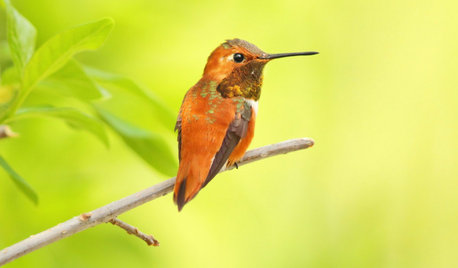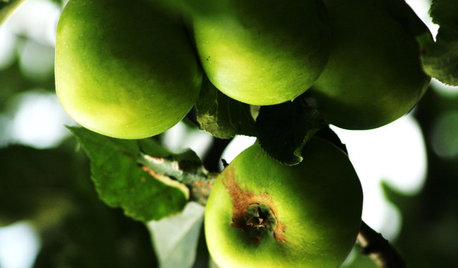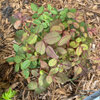Devastating Bacterial Cane Blight
nanadollZ7 SWIdaho
12 years ago
Featured Answer
Sort by:Oldest
Comments (15)
jerijen
12 years agoeveryrose
12 years agoRelated Discussions
Coulf fire blight be my problem?
Comments (22)yes, it is a nasty thing....and it does not occur in isolation - there will usually be a local outbreak. Certainly, in the UK orchards, it is now a notifiable disease (which means we must contact DEFRA if seen anywhere) and is, thankfully fairly rare. Have never seen or heard of a rose succumbing. On the other hand, I have had a 2 year battle with some awful business concerning Ghislaine de Feligonde which looks as though it has been attacked by girdlers although there are no obvious signs apart from the completely dead and crispy canes throughout the plant. Only GdF is affected despite being practically intertwined with several other roses. Still at the cane cutting stage and have not considered full-on removal yet....See MoreCane blight
Comments (7)That color on stems reminds me of Downy Mildew and the defoliation "yellowed and fallen off" sounds like DM. I'd move that pot away from the others, and see if you can get a plant pathologist to look at the undersides of the leaves for the mycelia (which are sparse...giving DM the species name sparsa). A paper within the past decade reports Downy Mildew being systemic in rose canes once the roses are sick. Arguing against DM are, I think, the temperatures you and your roses have been having. In Tennessee, fall seems to be the DM time. Could your rose location be cooled enough by part day shade to have given the fungus the temperature regime to get established? Ann...See MoreMunstead Wood cane dieback - will it survive? (Zone 7A)
Comments (15)Wow, I totally did not expect the volume of feedback. Thank you all so much for all the honest thoughts and advice (if only my DA roses were this receptive to my concern lol.) This is embarrassing to admit but this is actually my SECOND Munstead Wood already this year, and I only started doing balcony gardening/rose growing this summer. The first one was a bare-root from DA, and did not come out of dormancy at all. This one survived 3 months, and when she was happy, she was breathtaking (more photos at the end.) I am so in love with the fragrance and color of MW so I won't give her up completely, but I probably should take a break from DAs for now. Reading through the replies, I initially was a bit confused as there seemed to be 2 schools of thought regarding the amount of water, but now I think you all are right because the sudden Black Finger of Death (thanks Cynthia!) is probably due to both the prolonged water logging (pot sitting in the saucer with drying soil) and the lack of watering recently. I will dig it up and post photos of the roots as my early Halloween offering for the everyone :). I have always been renting in the DMV (I'm not from the area) so a small balcony/pot ghetto is the most I can offer to my roses at the moment. I honestly don't know what possesses me to think I can grow roses in such space-and-light constrained condition, but I can't stop (already thinking of what to order form Palatine...) I am putting the blame squarely on everyone here for posting such inspiring photos and being amazing all around :). Hopefully the roses will do better in my next rental with slightly bigger outdoor space and no surround glasses. My recently deceased MW threw a huge party in July - the fragrance was so intriguing to me that I brought the pot indoor overnight for a day to enjoy the blessing in greater concentration hehe :)....See MoreBacterial soft rot - another gift from 2020
Comments (17)I had something like that attack my Earth Angel last year. Parts of leaves and some petioles completely mush and smelled bad. Was it dead fish? Possibly. I removed affected parts and treated the whole area with Serenade. It's a strain of Bacillus subtilis and should be safe to use around everything. Erwinia is listed on the label (as is Sclerotinia). Will it work on this particular species? Possibly. The plant and then the disease came back this year but hasn't spread. Treated again with Serenade (early May?) and the plant didn't die but didn't seem completely cured either. Then I treated with Southern Ag Garden Friendly Fungicide - Bacillus amyloliquefaciens strain D747 (over a month ago). That seems to have done the trick, but the slugs really like this (and only this) plant in my garden this year. For now, I'm letting it be and sort of keeping it on the dry side. Only $26 a pint and you use 1 tsp/gallon. I went out and took a closer look. There are some dried damaged leaves and a couple leaves showing fresh signs and one small petiole wilted. Probably after the day of thunderstorms three days ago. And yes it does smell like dead fish. I took a couple of pics. You can see the fresh rot at 8:30 and 4:00 from the lower flower....See MorenanadollZ7 SWIdaho
12 years agojumbojimmy
12 years agonanadollZ7 SWIdaho
12 years agomichaelg
12 years agoMaryl (Okla. Zone 7a)
12 years agoptboise
12 years agonanadollZ7 SWIdaho
12 years agokentucky_rose zone 6
12 years agonanadollZ7 SWIdaho
11 years agonanadollZ7 SWIdaho
6 years agohenry_kuska
6 years agoerin sos (5b/6a) Central/West. Mass
6 years ago
Related Stories

GARDENING GUIDESBackyard Birds: Invite Entertaining Hummingbirds Into Your Garden
Hummingbirds — unique to the Americas — zip through open landscapes seasonally or year-round. Here’s how to attract them
Full Story
EDIBLE GARDENSHow to Add an Apple Tree to Your Edible Garden
Readily available, beautiful and fragrant, apple trees offer four-season interest along with crisp, juicy fruit
Full StorySponsored
Custom Craftsmanship & Construction Solutions in Franklin County








Rosylady (PNW zone 8)